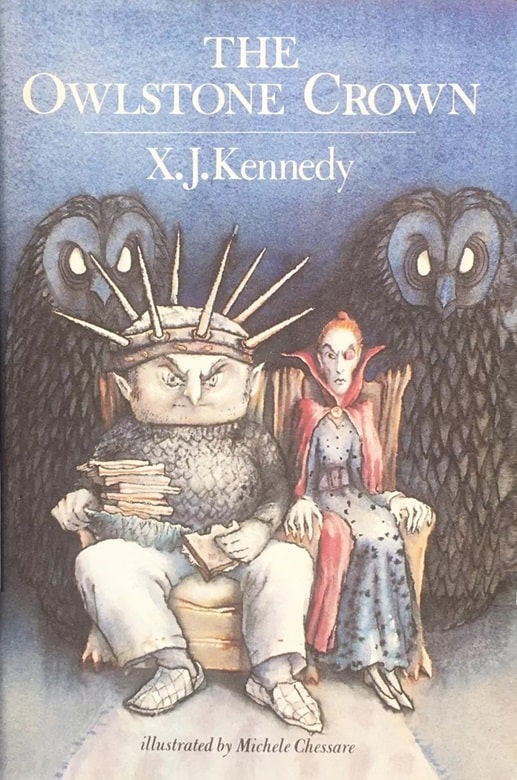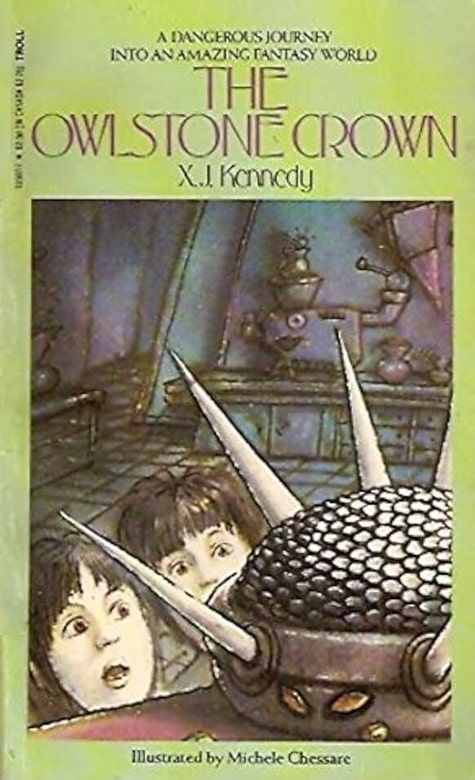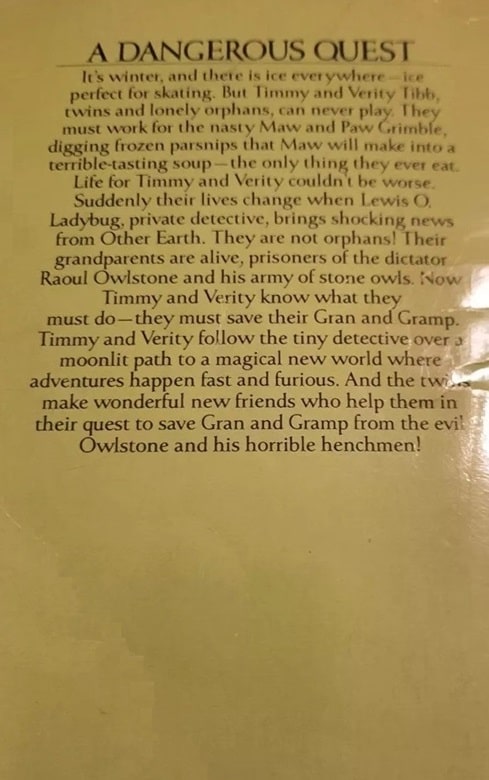Ladybug Private Detectives, Living Ponds, and Robot Owls: The Owlstone Crown by X. J. Kennedy

The latest in my series of reviews of mostly forgotten SF/F from the 1970s and 1980s is a fairly obscure YA fantasy. X. J. Kennedy was the name used for his writing by Joseph Charles Kennedy. He was known as Joe Kennedy but started using the X. J. pseudonym to avoid confusion with Joseph Kennedy, the father of President John F. Kennedy. Kennedy was born in 1929, and is still alive, aged 95. This makes him a candidate for oldest living SF/F writer.
He was a prominent SF fan from the mid ’40s to early ’50s, publishing the fanzine Vampire, and co-founding an APA, the Spectator Amateur Press Association, that is (according to Wikipedia) still active. He also sold two stories to prozines in 1951 — “No More Pencils, No More Books” (not to be confused with the John Morressy story) to Science Fiction Quarterly and “Music From Down Under” to Other Worlds; both as by “Joquel Kennedy.”
By then he had received his B.A. from Seton Hall, and his M.A. from Columbia, and he went into the Navy as a journalist for four years. After his service, he studied at the Sorbonne and at Michigan, then went into academia as a professor at UNC Greensboro and at Tufts. The bulk of his writing from the early ’50s on was poetry — much of it light verse, and much of it for children — and college textbooks. He was also an editor, and with his wife Dorothy he founded a magazine devoted to New Formalist poetry, Counter/Measures. He wrote the occasional short story, and two YA fantasy novels, of which The Owlstone Crown, from 1983, was the first.
 |
 |
The Owlstone Crown (Yearling, 1985). Cover artist unknown
The Owlstone Crown is a portal fantasy. Timmy and Verity Tibb are twins, almost thirteen years old, and orphans, living with a cruel old couple, Maw and Paw Grimble, who “adopted” them after their grandparents disappeared. The Grimbles treat the twins as essentially slaves. One day they encounter a talking ladybug, who turns out to be a cynical private detective. And the ladybug soon reveals that he was hired by Timmy and Verity’s grandmother to check up on them. For their grandparents weren’t killed — they slipped through a portal into another world.
Though Lewis the ladybug urges them not to follow him — the Other Earth in which their grandparents have landed is in terrible shape, ruled by a dictator, Raoul Owlstone, who has enslaved the population, and who has enclosed the life-giving Moonflower in a dome, away from the Sun. The animals who rely on the tree are dying, and the people are in similarly bad shape. But Timmy and Verity think anything is an improvement on living with the Grimbles, and they do manage to escape into the Other Earth.
There they encounter a variety of characters, such as a talking bear named Fardels, an oracular snail named Shelley, a living pond named Cressida, and Mustard, the son of an inventor who has been imprisoned by Raoul and made to create robotic machines for him, especially the Stone Owls. The two children work to find their grandparents, who conveniently are on Moonflower Mountain, where Raoul Owlstone lives with his consort of sorts, the Baroness Ratisha. There are many perils, and some comic relief, as they struggle to foil Raoul’s plan to crown himself Emperor and kill all his rivals.
I have to say — this novel is just OK. It’s pretty much a bog-standard YA fantasy, with the expected plucky kids with mild issues to overcome (Timmy’s cowardice and Verity’s poor eyesight), some amusing animal sidekicks, comically awful villains, and a happy ending (with a mild twist at the conclusion.)
In some ways — in lots of ways — it is exactly the sort of thing “Lemony Snicket” (Daniel Handler) is parodying in his Series of Unfortunate Events. X. J. Kennedy is a pretty important poet, and overall has had a very impressive career — but I think his fantasies likely among the least of his works.
Rich Horton’s last article for us was a review of Impossible Creatures by Katherine Rundell. His website is Strange at Ecbatan. Rich has written over 200 articles for Black Gate, see them all here.
I think I read this book at camp one summer, maybe around sixth grade. I don’t remember much about it, except that the word “owlstone” rings a bell, and that the book was a fantasy with something about eating something strange, and some strange hints of science fiction and stuff that was kinda alive, and kinda not. And is there something that oozes in it?
Yes to all of those things! I think you must have read it.